Embracing Green Spaces: Nature's Gifts for Older Adults
Are older adults missing out on the benefits of spending time in green spaces? Research shows that nature can significantly improve mental and physical well-being for seniors. In this article, readers will discover key topics such as practical activities to engage with nature, ways to create accessible green spaces, and tips for promoting social connections outdoors. By understanding how to incorporate green spaces into daily life, seniors can address feelings of isolation and enhance their overall health. This content will serve as a guide to help those in Massachusetts connect with nature and their community, leading to better health outcomes.
Key Takeaways
• Green spaces greatly enhance physical and mental well-being for older adults through regular engagement
• Community programs foster social connections, helping to combat feelings of isolation among seniors
• Accessible parks with proper seating and pathways are essential for promoting outdoor activities for seniors
• Gardening activities encourage both physical health and social interaction, benefiting older adults' quality of life
• Nature-related exercises improve cardiovascular health, flexibility, and overall fitness for older adults
Recognizing the Benefits of Green Spaces for Seniors
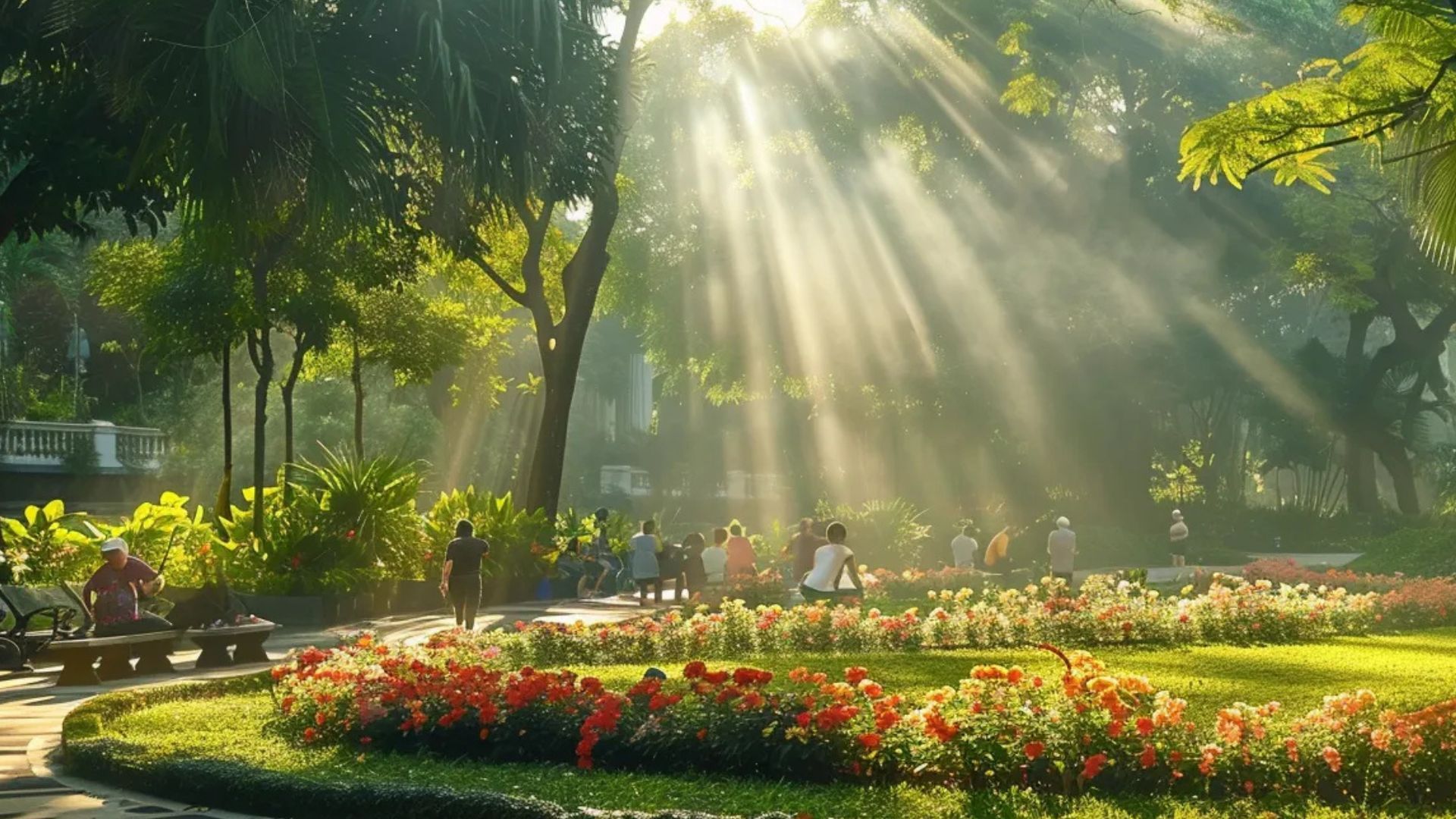
Understanding how green spaces enhance the quality of life for older adults is essential. Through various outdoor activities, seniors can boost physical health and experience notable mental health advantages. Access to these natural environments helps reduce feelings of isolation, while community programs encourage engagement. The following sections will identify beneficial exercises and highlight the importance of respite care for caregivers managing insurance needs, centering on the primary benefits of nature for seniors.
Understand How Green Spaces Boost Physical Health for Older Adults
Green spaces play a vital role in enhancing the physical well-being of older adults. Engaging in outdoor activities, such as walking or gardening, can lead to improved cardiovascular health, which is especially important considering the prevalence of cardiac issues among seniors. Through Care Concierge Services, individuals can receive personalized support in accessing these beneficial environments, ensuring safe participation in exercises that help prevent injuries and promote overall fitness. Visiting facilities like Beth Israel Deaconess Medical Center can further reinforce this connection between nature and health, as nurse practitioners often recommend outdoor activities as part of a comprehensive wellness plan.
Discover Mental Health Advantages of Nature for Seniors
Engaging with green spaces offers significant mental health benefits for older adults. Spending time in nature can alleviate symptoms of anxiety and depression, providing a soothing environment that enhances overall well-being. Physicians often encourage seniors to participate in outdoor activities as part of a holistic approach to health, which may also include medication management and regular check-ups in fields such as internal medicine and emergency medicine. By fostering connections within these environments, seniors can reduce feelings of isolation and build supportive relationships, ultimately improving their mental health and quality of life.
Learn How Outdoor Activities Reduce Isolation Among Elderly People
Outdoor activities serve as an effective means for older adults to combat feelings of isolation. In cities like Boston, community programs often organize group outings to parks, allowing seniors to engage socially while benefiting from fresh air and exercise. By utilizing resources like a patient portal, seniors can connect with nursing professionals who can suggest local activities, ensuring that they remain active and involved, which is essential for enhanced mental and emotional health.
Identify Exercises That Can Be Done in Parks and Gardens
Older adults can engage in numerous exercises within parks and gardens that promote health and enhance overall well-being. Simple activities such as walking, stretching, and practicing balance exercises require minimal equipment and can easily be integrated into daily routines. Additionally, gardening offers a way to stay active while enjoying the natural environment, fostering a sense of purpose and connection to the earth, which is crucial for mental health. Considering the accessibility of these locations, healthcare professionals often recommend these exercises as part of a balanced wellness plan that considers the diverse needs of older adults, ensuring they receive the necessary attention and support for their physical health.
| Exercise | Benefits | Accessibility Considerations |
|---|---|---|
| Walking | Improves cardiovascular health and boosts mood | Flat paths and benches are ideal for resting |
| Stretching | Enhances flexibility and reduces injury risk | Perform stretches at resting areas or grassy spots |
| Gardening | Offers physical activity and fosters mental well-being | Accessible garden patches with raised beds for easier reach |
| Balance Exercises | Improves stability and reduces fall risk | Use benches or nearby structures for support |
Acknowledge the Importance of Access to Natural Environments
Access to natural environments is essential for older adults, as it contributes significantly to overall health and well-being. Regular interaction with green spaces can help combat diseases while enhancing physical and mental health. Providers, including primary care professionals at Beth Israel Lahey Health and Deaconess facilities, often emphasize the importance of fresh air and natural settings, particularly for those managing allergies or chronic conditions, as this access can lead to improved quality of life.
Engaging in outdoor activities not only promotes exercise but also fosters community connections, combating feelings of isolation often experienced by seniors. By prioritizing access to parks and gardens, caregivers can support their loved ones in reaping the numerous physical and psychological benefits of nature:
| Benefits of Access to Natural Environments | Examples of Activities | Health Impacts |
|---|---|---|
| Improved Mental Health | Walking, Gardening | Reduces anxiety and depression |
| Enhanced Physical Fitness | Stretching, Balance Exercises | Boosts cardiovascular health |
| Community Engagement | Group Outings | Lessens feelings of isolation |
| Allergy Relief | Spending time outdoors | Improves overall comfort and health |
Explore Community Programs Promoting Green Space Use for Seniors
Community programs designed for older adults play a significant role in promoting the use of green spaces. Local organizations often coordinate group activities such as nature walks, gardening clubs, and social events in parks to engage seniors and encourage physical activity. These initiatives not only provide opportunities for exercise but also facilitate connection, reducing feelings of loneliness while enhancing overall well-being.
• Nature walks organized by local health departments for seniors.
• Gardening clubs facilitating social interaction and skill development.
• Exercise classes held in parks, promoting both fitness and community bonding.
• Informational sessions about the benefits of nature held by community centers.
Engaging With Nature: Activities for Older Adults
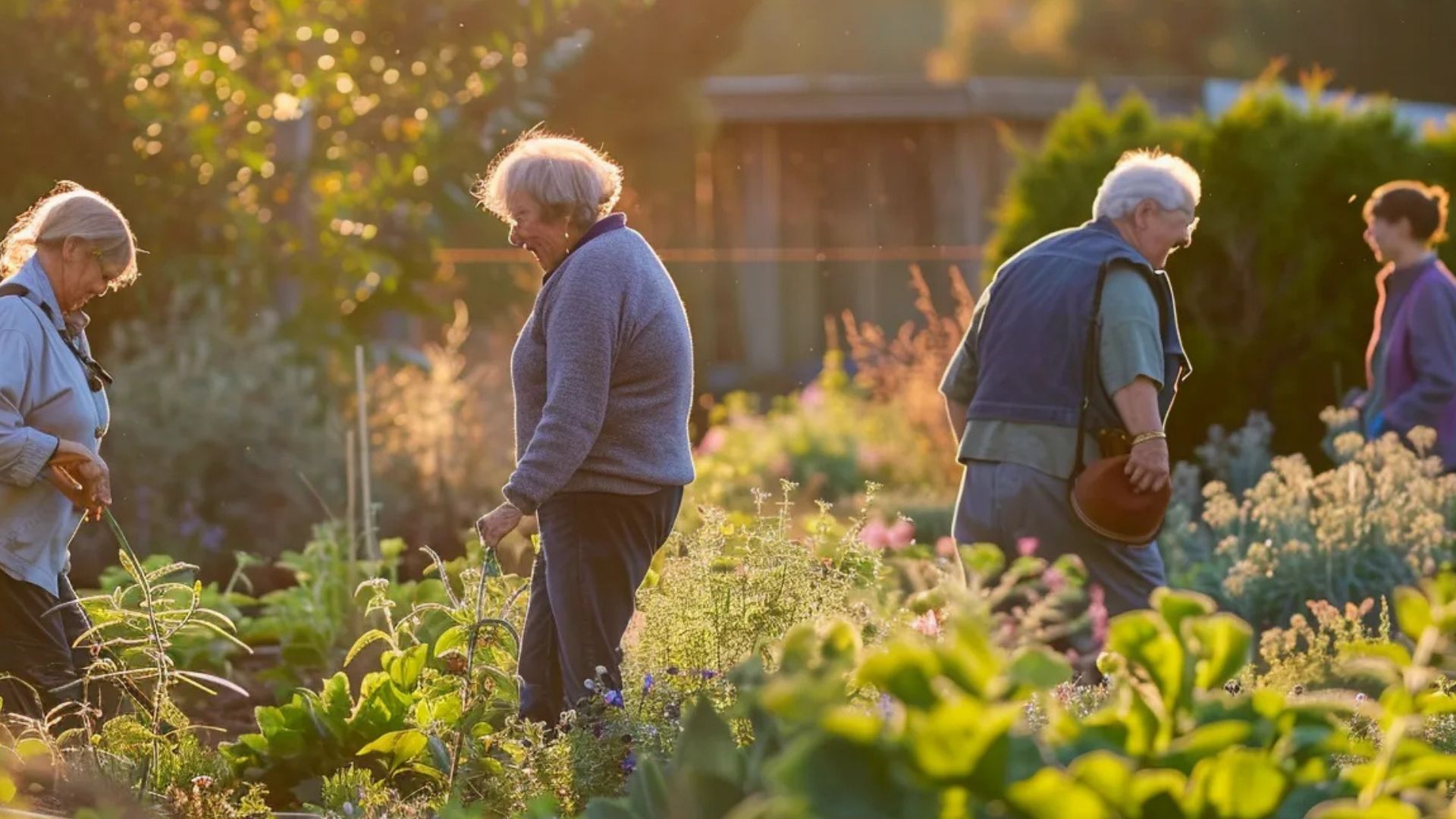
Older adults have numerous opportunities to engage with green spaces through various activities that promote physical and mental well-being. Finding local gardening clubs can enhance their sense of community while offering valuable skills. Participating in guided nature walks encourages an active lifestyle, and birdwatching provides calming moments through wildlife observation. Outdoor yoga sessions designed for seniors foster relaxation, while creative arts and crafts inspired by nature allow for self-expression. Finally, volunteering in community green spaces offers fulfilling ways to give back while enjoying the outdoors.
Find Local Gardening Clubs and Their Benefits for Seniors
Local gardening clubs offer older adults a wonderful opportunity to stay active while enjoying the benefits of nature. Engaging in gardening fosters physical activity and enhances mental well-being by providing a sense of accomplishment and purpose. Many clubs also promote social interaction, allowing seniors to build connections and friendships with fellow community members, which can help combat feelings of loneliness and isolation.
Participate in Guided Nature Walks for an Active Lifestyle
Participating in guided nature walks offers older adults a fantastic way to maintain an active lifestyle while enjoying the outdoors. These organized outings provide seniors with the opportunity to explore local parks and natural areas under the supervision of knowledgeable leaders, ensuring both safety and engagement. By incorporating regular walking sessions into their routine, seniors can enhance their physical health, improve their mood, and foster connections with other participants, thereby enriching their social lives and overall well-being.
Enjoy Birdwatching and the Calming Effects of Wildlife Observation
Engaging in birdwatching allows older adults to connect with nature while providing significant mental health benefits. Observing various bird species enhances focus and attention, offering a soothing experience that can alleviate symptoms of anxiety and stress. Many community programs organize birdwatching events in local parks, making it easy for seniors to participate and enjoy the calming effects of wildlife observation in a supportive environment.
Try Outdoor Yoga Sessions Specifically Designed for Older Adults
Outdoor yoga sessions designed specifically for older adults provide a gentle yet effective way to improve flexibility, balance, and overall physical health. These classes often take place in serene natural environments, allowing seniors to connect with nature while engaging in mindful movement and relaxation techniques. Caregivers interested in promoting wellness for their loved ones can seek local programs that focus on the unique needs of older participants, which can significantly enhance their physical and mental well-being:
| Benefits of Outdoor Yoga for Seniors | Examples of Yoga Techniques | Health Outcomes |
|---|---|---|
| Improves flexibility and mobility | Gentle stretches, seated poses | Enhances daily functioning and reduces stiffness |
| Promotes relaxation and reduces stress | Breathing exercises, mindfulness techniques | Alleviates anxiety and promotes mental calmness |
| Encourages social interaction | Group sessions, partner poses | Builds community connections and combats loneliness |
| Enhances overall fitness | Standing poses, balance exercises | Reduces fall risk and improves physical health |
Suggest Creative Arts and Crafts Inspired by Natural Surroundings
Creative arts and crafts activities rooted in natural surroundings provide older adults with unique opportunities to express themselves while enjoying the benefits of green spaces. For instance, seniors can create nature-inspired paintings or collages using leaves, flowers, and twigs collected during park outings, allowing them to blend art with the beauty of the outdoors. Engaging in such activities not only enhances their artistic skills but also fosters a deeper connection to nature, contributing to overall well-being and providing a fulfilling way to spend time outdoors.
Share Opportunities for Volunteering in Community Green Spaces
Volunteering in community green spaces offers older adults an excellent way to give back while enjoying nature. Opportunities such as participating in park clean-up events, assisting in community gardens, or helping to organize local nature programs can all promote physical activity and social interaction. These activities not only enhance personal well-being but also foster a sense of belonging within the community, addressing feelings of isolation while encouraging environmental stewardship:
• Participate in park clean-up events to enhance local environments.
• Contribute to community gardens by planting and maintaining greenery.
• Help organize nature programs that involve local seniors and families.
• Join workshops focused on sustainable gardening and eco-friendly practices.
Creating Accessible Green Spaces for Seniors
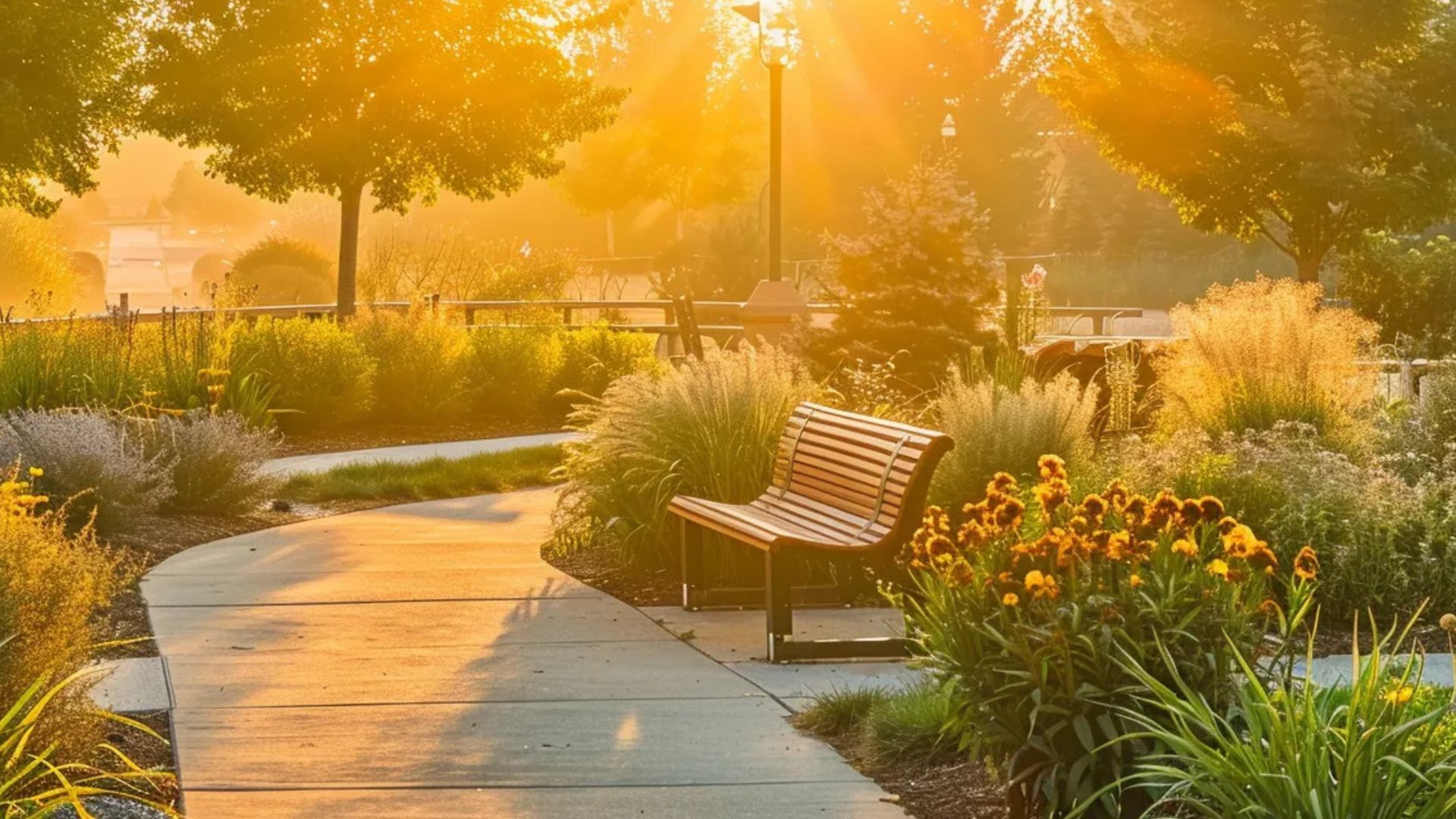
Design features that enhance accessibility in parks are essential for older adults. The inclusion of adequate seating and resting areas, safe walking paths, and sensory gardens offers significant benefits. Collaborating with local governments ensures that these spaces cater to diverse needs, promoting a more inclusive environment that encourages seniors to engage with nature and enjoy its many gifts.
Review Design Features That Enhance Accessibility in Parks
Design features that enhance accessibility in parks play a crucial role in ensuring older adults can fully enjoy green spaces. Wide, smooth walking paths accommodate mobility aids, while strategically placed rest areas offer seniors a chance to pause and recharge during their outdoor activities. Additionally, sensory gardens with various textures and scents provide a multi-dimensional experience, engaging seniors’ senses and encouraging exploration, ultimately making green spaces more inviting and beneficial for their well-being.
Assess the Importance of Seating and Resting Areas for Seniors
Seating and resting areas within green spaces are essential for older adults, as they provide necessary opportunities for breaks during outdoor activities. These areas allow seniors to rest, resulting in prolonged enjoyment of nature while reducing fatigue and discomfort. Moreover, strategically placed benches and shaded spots not only enhance accessibility but also foster social interactions among seniors, promoting a sense of community that further improves their overall well-being.
Identify Safe Walking Paths and Their Significance for Older Adults
Safe walking paths are essential in green spaces, significantly enhancing accessibility for older adults. Well-designed pathways, which are smooth and free of obstructions, reduce the risk of falls and injuries, allowing seniors to explore the outdoors with confidence. By ensuring these paths are easily navigable and well-maintained, communities can encourage older adults to engage in regular physical activity, leading to improved health and well-being.
Discuss Incorporating Sensory Gardens to Stimulate the Senses
Incorporating sensory gardens into green spaces provides a unique opportunity to stimulate the senses of older adults, enhancing their overall experience with nature. These gardens can include a variety of plants with different textures, colors, and fragrances, allowing seniors to engage their senses actively. By creating environments that encourage exploration and interaction, community planners can significantly improve the well-being of older individuals while fostering a deeper connection to the natural world:
| Sensory Garden Features | Benefits for Seniors | Implementation Ideas |
|---|---|---|
| Diverse Textures | Enhances tactile engagement | Include plants like lamb's ear and ferns |
| Vibrant Colors | Stimulates visual interest | Plant colorful flowers like marigolds and petunias |
| Fragrant Plants | Encourages olfactory engagement | Integrate herbs such as rosemary and lavender |
| Sound Features | Promotes auditory stimulation | Add water features or wind chimes |
Explore Collaboration With Local Governments for Enhanced Spaces
Collaboration with local governments is essential for enhancing the accessibility of green spaces for older adults. By working together, communities can identify areas in need of improvement, such as the addition of safe walking paths, seating areas, and sensory gardens tailored to the needs of seniors. This teamwork not only promotes the physical health of the elderly but also supports mental well-being by creating inviting environments where they can enjoy nature safely and comfortably:
| Collaboration Opportunities | Benefits for Seniors | Examples of Initiatives |
|---|---|---|
| Community Planning Meetings | Informs local leaders about senior needs | Gather input on park design |
| Joint Funding Opportunities | Secures resources for park enhancements | Apply for grants specifically for senior accessibility |
| Awareness Campaigns | Promotes the use of green spaces | Organize events to engage seniors in nature activities |
| Accessibility Audits | Identifies barriers within existing parks | Assess current facilities to improve usability |
Advocate for Inclusive Features That Cater to Diverse Needs
Advocating for inclusive features in green spaces is vital to meet the diverse needs of older adults. Parks should incorporate elements such as smooth walking paths, ample seating areas, and sensory gardens, ensuring that they are safe and accessible for everyone, including those with mobility challenges. By engaging community members and local governments, stakeholders can work together to design environments that promote the well-being of seniors and enhance their connection to nature:
• Smooth walking paths for easy navigation
• Ample seating areas for rest and social interaction
• Accessible sensory gardens to stimulate engagement
• Community involvement in park design and planning
Promoting Social Connections in Green Spaces
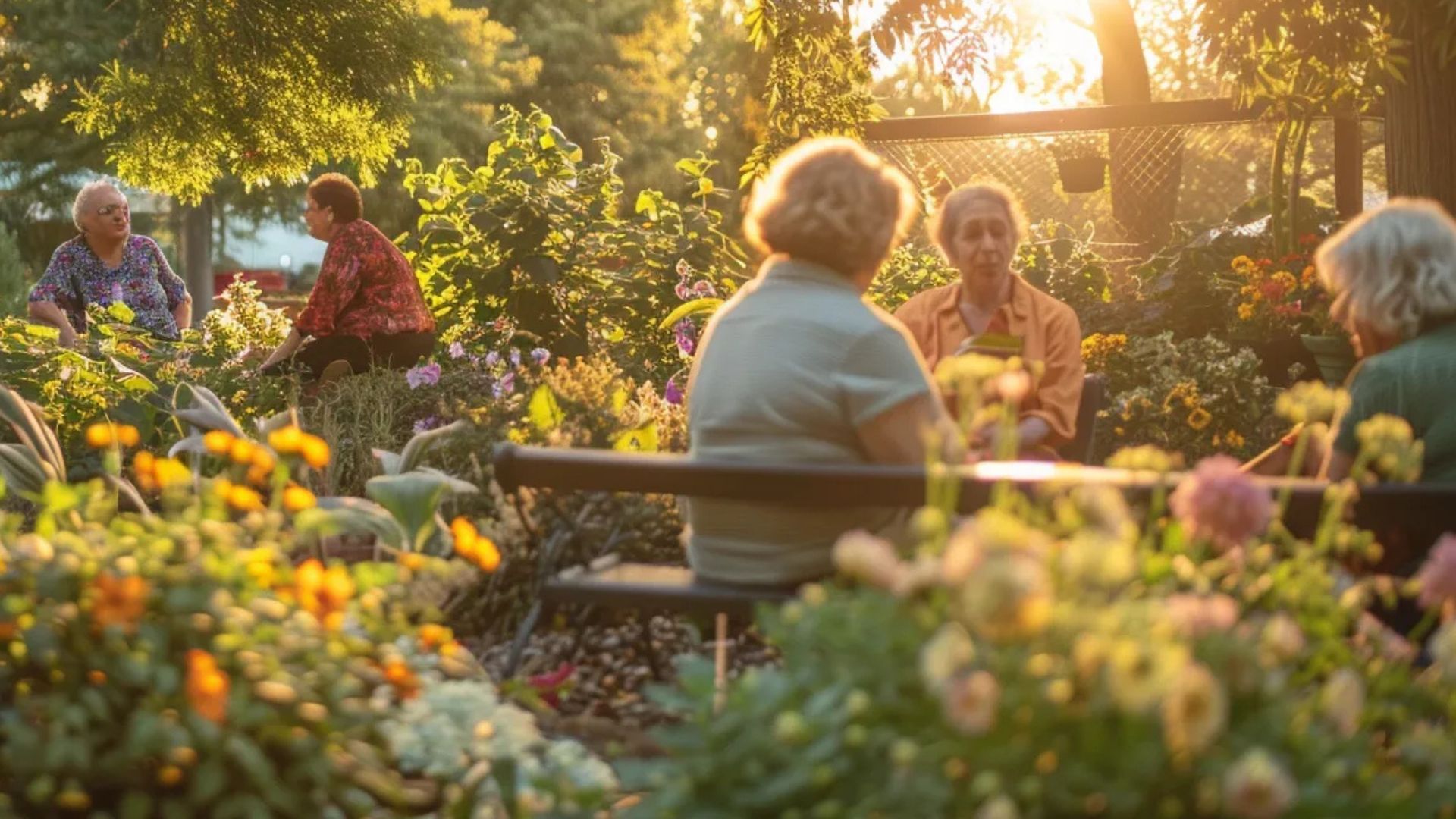
Community gardens play a significant role in fostering friendships among older adults, creating opportunities for social interaction and shared experiences. Participation in organized activities within parks allows seniors to engage with peers, building meaningful relationships. Through volunteer opportunities in nature, many seniors discover companionship, while clubs and organizations encourage social gatherings outdoors. These connections enhance their overall well-being and quality of life.
Highlight the Role of Community Gardens in Fostering Friendships
Community gardens serve as vital spaces for older adults to cultivate friendships and build social connections. By engaging in shared gardening activities, seniors can meet others who share similar interests, fostering a sense of belonging within their community. Collaborative projects in these gardens not only promote teamwork but also create opportunities for meaningful conversations, enhancing emotional well-being and reducing feelings of isolation.
Encourage Participation in Organized Activities in Parks
Encouraging seniors to engage in organized activities in parks can significantly enhance their social connections. These events, such as group exercises, arts and crafts sessions, or community picnics, provide opportunities for older adults to interact with their peers, share experiences, and form friendships. By participating in these communal activities, seniors benefit from improved mental health and more vibrant social life, ultimately enriching their overall well-being while enjoying the beauty of green spaces.
Discuss the Impact of Green Spaces on Building Relationships
Green spaces play a crucial role in fostering relationships among older adults, serving as lively venues for social interaction and shared experiences. When seniors gather in parks to participate in community activities, they create opportunities to build friendships and connect with peers who share common interests. Engaging in these natural settings not only reduces feelings of loneliness but also enhances the emotional well-being of older adults, as meaningful connections contribute to a fulfilling life.
Connect Older Adults With Volunteer Opportunities in Nature
Connecting older adults with volunteer opportunities in nature offers a rewarding way to build community and strengthen social ties. Participating in activities such as park clean-ups, community gardening, or organizing nature programs allows seniors to engage meaningfully with their environment and meet like-minded individuals. These volunteer experiences not only contribute to the well-being of local green spaces but also help alleviate feelings of loneliness and enhance the overall quality of life for older adults:
• Engage in park clean-up events to improve local natural environments.
• Join community gardens for collaborative gardening experiences.
• Assist in organizing nature programs that involve local seniors.
• Participate in workshops focused on sustainable gardening techniques.
Share Success Stories of Seniors Finding Companionship Outdoors
Many seniors have experienced the joy of finding companionship in green spaces, leading to enhanced quality of life. For example, a group of older adults regularly meets at a local park to participate in community gardening, creating vibrant floral arrangements while forging lasting friendships. These interactions not only promote social connections but also provide a sense of belonging that significantly reduces feelings of isolation:
• A community gardening group brings together seniors weekly.
• Participants cultivate flowers and vegetables, sharing gardening tips and experiences.
• Regular meetings foster friendships, enhancing their social lives.
• The group engages in outdoor exercises, combining nature with physical activity.
Promote Clubs and Organizations for Social Gatherings in Parks
Promoting clubs and organizations dedicated to social gatherings in parks serves as a vital way to foster connections among older adults. These groups often host activities such as nature walks, exercise classes, and art sessions, creating a welcoming environment for seniors to meet peers and share experiences. Engaging in such community initiatives not only enhances social interactions but also builds support networks that significantly improve overall well-being and reduce feelings of loneliness.
Integrating Green Spaces Into Daily Life for Seniors
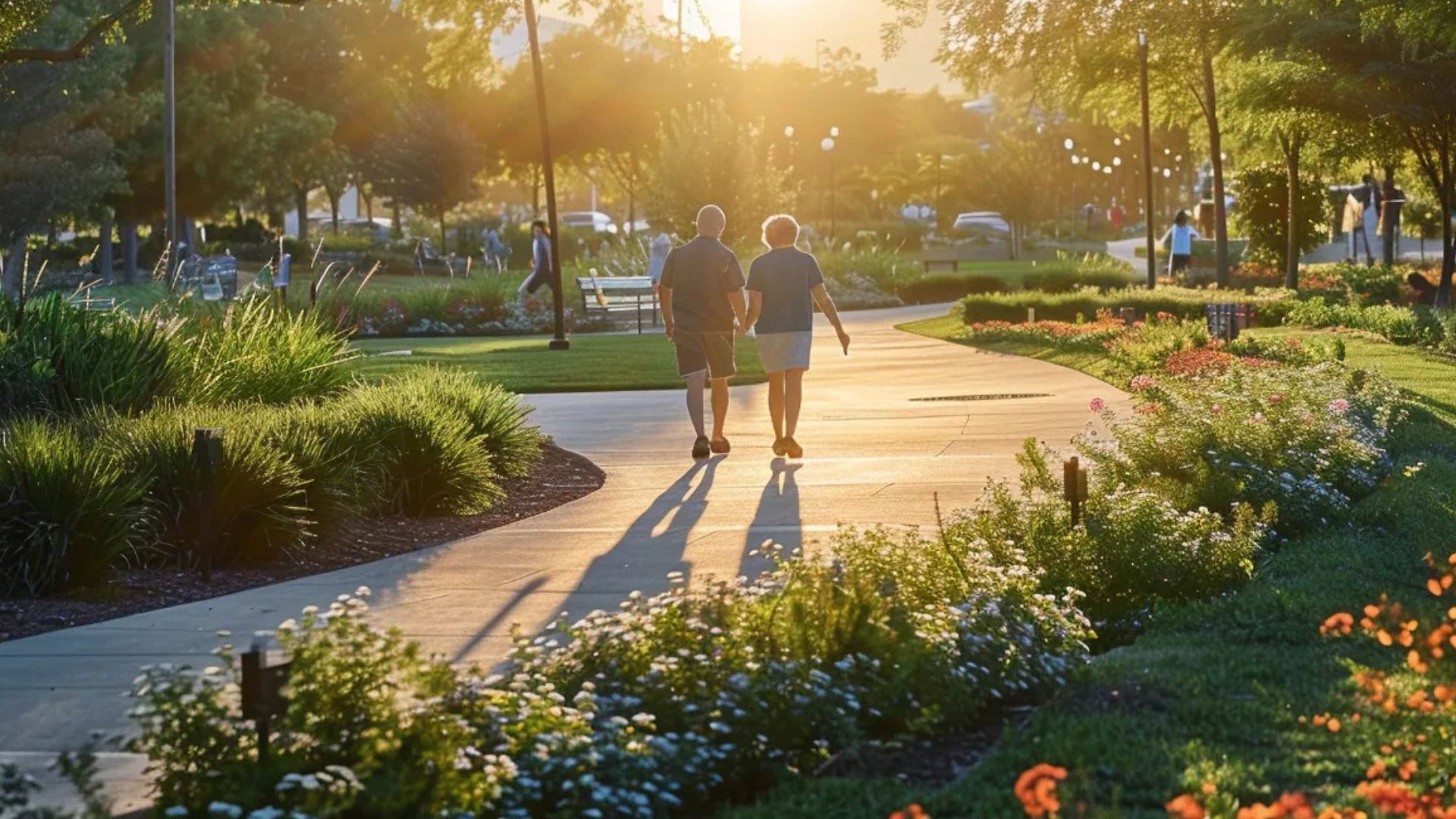
Daily visits to nearby parks and gardens can significantly enhance the well-being of older adults. Establishing routines that incorporate green space access, including tips for managing health conditions, can lead to enjoyable outdoor experiences. Inviting friends and family fosters social connections while regular exposure to nature promotes mental and physical health. Utilizing tools and apps to find local green spaces adds convenience to this enriching experience.
Suggest Strategies for Daily Visits to Nearby Parks and Gardens
To encourage daily visits to nearby parks and gardens, older adults can establish a routine that includes these natural spaces in their weekly schedules. Setting specific days and times for outdoor activities, such as morning walks or afternoon gardening sessions, can help create a consistent habit. Using community resources, such as local newsletters or senior centers, may provide information on organized events and group outings, making it easier for seniors to stay engaged with their surroundings:
| Strategy | Description | Benefits |
|---|---|---|
| Scheduled Visits | Select specific days and times for outdoor activities. | Creates consistency and habit-forming visits. |
| Community Resources | Utilize local newsletters to find park events. | Enhances engagement and social interaction. |
| Group Activities | Join organized outings from senior centers. | Fosters companionship and shared experiences. |
Encourage Making Green Space Access a Part of the Routine
Encouraging older adults to incorporate visits to green spaces into their daily routine can significantly enhance their overall well-being. Establishing specific times for outdoor activities, such as morning walks or afternoon gardening, creates consistency that promotes physical health and social engagement. By accessing these natural environments regularly, seniors can benefit from fresh air, exercise, and opportunities to connect with nature, ultimately enriching their quality of life.
Share Tips for Enjoying Nature While Managing Health Conditions
For older adults managing health conditions, enjoying nature can be tailored to fit their specific needs. Engaging in gentle activities, such as short nature walks or birdwatching sessions, allows seniors to experience the outdoors in a safe and manageable way. It is beneficial for caregivers to consult healthcare providers about suitable activities, ensuring that the chosen outdoor experiences harmonize with any ongoing treatment plans, thus promoting both physical and mental well-being while enjoying nature’s gifts.
Discuss the Importance of Inviting Friends and Family Outdoors
Inviting friends and family to enjoy outdoor activities together can enhance the overall experience of visiting green spaces for seniors. Social interactions during these outings not only foster connections but also create a supportive environment that encourages physical activity and mental well-being. Sharing these moments with loved ones amplifies the benefits of nature, as companionship plays a vital role in reducing feelings of isolation and boosting emotional health.
Highlight the Benefits of Regular Outdoor Exposures for Wellbeing
Regular outdoor exposure offers numerous benefits for older adults, significantly enhancing their overall well-being. Engaging consistently with green spaces allows seniors to experience natural light, which is crucial for maintaining vitamin D levels, positively affecting their mood and energy levels. Furthermore, time spent outdoors can foster a sense of belonging and connection to the community, addressing feelings of loneliness that many older adults encounter.
Recommend Tools and Apps for Locating Nearby Green Spaces
For seniors seeking to integrate green spaces into their daily lives, various tools and apps are available to help locate nearby parks and gardens. Applications like "AllTrails" and "ParkBuddy" can assist users in finding accessible walking paths and community gardens tailored to their needs. By utilizing these resources, older adults can easily plan outings that enhance their physical and mental well-being, ensuring regular engagement with nature and the social connections it fosters.
Overcoming Barriers to Nature Access for Older Adults
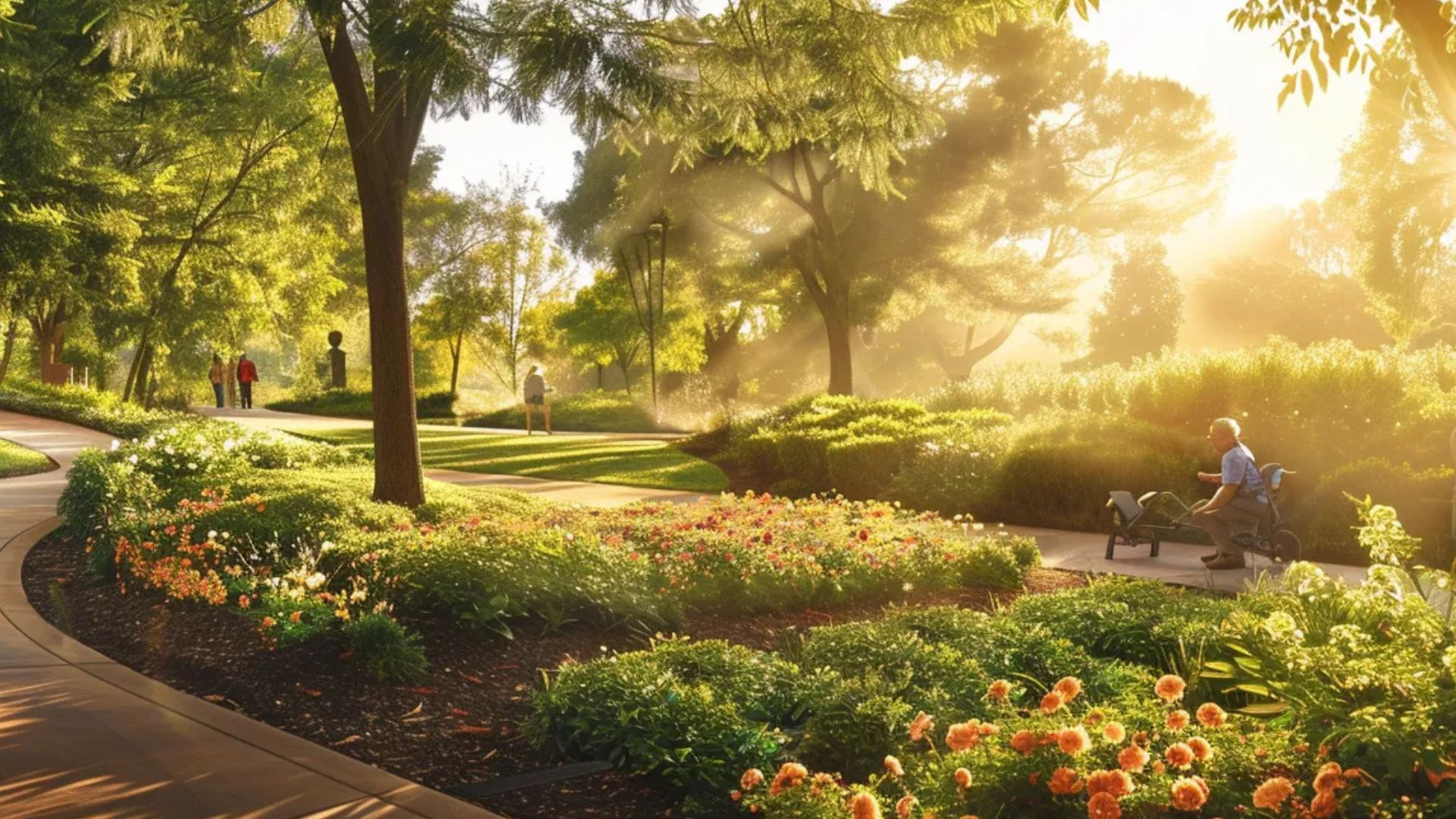
Older adults frequently encounter various challenges when accessing green spaces, including transportation difficulties and limited mobility options. To address these issues, community initiatives focus on improving access to parks and gardens, while resources are available to assist seniors in navigating mobility concerns. Advocacy for better green space access is essential, along with efforts to raise awareness among younger generations about the needs of older adults.
Identify Common Challenges Seniors Face in Accessing Green Areas
Accessing green spaces often presents challenges for older adults, primarily due to mobility limitations and transportation issues. Many seniors may find it difficult to navigate uneven terrain or travel to parks without reliable means of transport, which can discourage their participation in outdoor activities. Addressing these barriers, communities can implement initiatives focused on enhancing accessibility and providing transportation options tailored specifically for older adults, ensuring they can enjoy the physical and mental benefits of nature.
• Mobility limitations can hinder access to parks.
• Transportation issues prevent seniors from reaching green spaces.
• Community initiatives can enhance accessibility and provide transportation options.
Discuss Transportation Solutions to Reach Parks and Gardens
Transportation solutions play a critical role in helping older adults access parks and gardens, fostering their well-being through nature interaction. Community initiatives that provide shuttle services specifically designed for seniors or partnerships with local transit authorities can dramatically enhance mobility. Furthermore, organizing volunteer driver programs can ensure that seniors receive the necessary assistance to reach green spaces safely, thereby encouraging regular outdoor engagement and increasing community connection.
Explore Community Initiatives Aimed at Improving Access
Community initiatives aimed at improving access to green spaces for older adults play a pivotal role in overcoming barriers that hinder their engagement with nature. Local organizations often collaborate with public agencies to create programs that provide transportation services specifically designed for seniors, ensuring they can reach parks and gardens without difficulty. Additionally, community events that promote the accessibility of these spaces help raise awareness and encourage participation, highlighting the physical and mental health benefits of regular outdoor activity:
• Transportation services tailored for seniors.
• Community events promoting park accessibility.
• Collaborations with public agencies to improve infrastructure.
Provide Resources for Navigating Mobility Issues in Nature
To assist older adults in navigating mobility issues while engaging with green spaces, communities can develop resources such as guided tours specifically designed for those with mobility challenges. Additionally, establishing partnerships with local transportation services can help facilitate access to parks and gardens, ensuring seniors can comfortably reach these natural environments. Providing information on accessible pathways and amenities at various outdoor locations enhances the overall experience for older adults, empowering them to enjoy the physical and mental health benefits that come from connecting with nature.
Share Insights on Advocating for Better Green Space Access
Advocating for better access to green spaces for older adults requires a collaborative approach that engages community members, local governments, and organizations focused on senior well-being. Stakeholders can raise awareness about the need for mobility-friendly park designs, improved transportation options, and accessible pathways by organizing community meetings and initiatives. These concerted efforts can lead to tangible improvements in the availability of natural environments, enabling seniors to fully benefit from the physical and mental health advantages that green spaces provide.
Suggest Building Awareness Among Younger Generations About Needs
Building awareness among younger generations about the needs of older adults in accessing green spaces is vital for fostering an inclusive community. Schools and organizations can implement educational programs focused on the benefits of nature for seniors, encouraging youth to engage in volunteer opportunities that enhance accessibility in parks. By facilitating intergenerational interactions, young people can gain insight into the challenges faced by older adults, ultimately creating a supportive environment that promotes the use of green spaces for everyone's benefit.
Conclusion
Embracing green spaces offers older adults vital physical and mental health benefits that significantly enhance their quality of life. Engaging in outdoor activities fosters social connections, reduces feelings of isolation, and promotes overall well-being. By prioritizing accessibility to nature, communities can create inclusive environments where seniors thrive. Encouraging regular interaction with green spaces empowers older adults to stay active and engaged, fully realizing nature's gifts.


